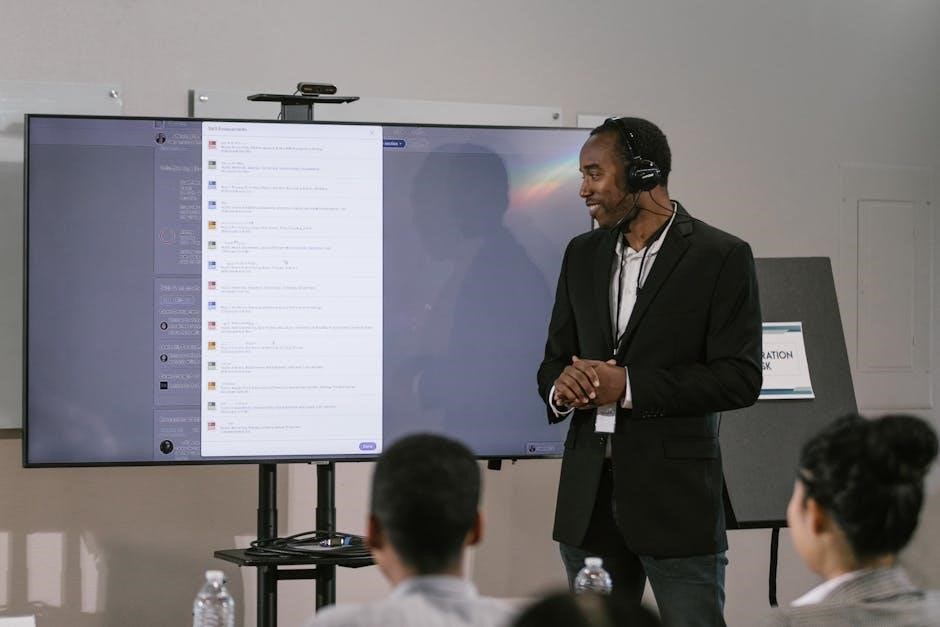An instructional coach is an educator who supports teachers in improving their instructional skills to enhance student learning and educational outcomes in schools.
They work collaboratively with teachers to strengthen teaching practices and promote a culture of continuous improvement in education.
1.1 Definition of an Instructional Coach
An instructional coach is an educational leader who collaborates with teachers to enhance teaching practices, student learning, and classroom outcomes. They provide personalized support, evidence-based strategies, and professional development opportunities to help educators improve their instructional skills. Unlike evaluators, coaches act as partners, focusing on growth and reflection to ensure teachers feel empowered and equipped to create impactful learning environments for all students.
Their role emphasizes fostering a culture of continuous improvement, innovation, and data-driven decision-making in education.
1.2 The Role of an Instructional Coach in Education
An instructional coach plays a pivotal role in education by supporting teachers in enhancing their instructional practices and fostering a positive learning environment. They collaborate with educators to identify areas for growth, develop tailored strategies, and implement data-driven approaches to improve teaching effectiveness. Coaches also facilitate professional development opportunities, encourage reflection, and help integrate innovative techniques into the classroom. Their efforts aim to elevate both teacher confidence and student achievement, contributing to a more impactful educational experience.
Key Responsibilities of an Instructional Coach
An instructional coach supports teachers through professional development, provides feedback, facilitates collaboration, and analyzes data to enhance teaching strategies and student outcomes effectively.
2.1 Supporting Teachers in Professional Development
Instructional coaches play a vital role in supporting teachers’ professional growth by creating personalized development plans, facilitating workshops, and encouraging the integration of innovative teaching strategies. They help educators identify learning goals, implement new practices, and reflect on their teaching methods to enhance classroom effectiveness. By fostering a culture of continuous improvement, coaches empower teachers to stay updated on best practices, ultimately benefiting student learning and overall educational outcomes;
2.2 Providing Individualized Coaching and Feedback
Instructional coaches provide tailored support to teachers through one-on-one coaching sessions, helping them set professional goals and refine their teaching strategies. Coaches offer constructive feedback based on classroom observations and data analysis, empowering teachers to reflect on their practices and make meaningful improvements. This personalized approach ensures that teachers receive targeted guidance, enhancing their instructional effectiveness and ultimately benefiting student learning and academic success.
2.3 Facilitating Collaboration Among Teachers
Instructional coaches foster collaboration by bringing teachers together to share strategies, resources, and best practices. They organize professional learning communities, workshops, and peer coaching opportunities, encouraging educators to support one another. By promoting a culture of teamwork and shared expertise, coaches help teachers refine their instructional practices, leading to improved classroom outcomes and enhanced student learning experiences.

The Impact of Instructional Coaching
Instructional coaching positively influences teaching practices, elevates student performance, and fosters teacher confidence while integrating technology to enhance educational experiences.
3.1 Improving Teaching Quality and Student Outcomes
Instructional coaching enhances teaching quality by providing personalized support, enabling teachers to refine their strategies and improve classroom practices. By analyzing data and offering constructive feedback, coaches help educators identify areas for growth, leading to better lesson planning and delivery. This, in turn, elevates student engagement, academic performance, and overall outcomes. The collaborative process fosters a culture of continuous improvement, ensuring teachers are equipped to meet diverse student needs effectively.
3.2 Enhancing Teacher Confidence and Classroom Practices
Instructional coaching empowers teachers by fostering confidence in their abilities and refining their classroom practices. Through one-on-one coaching, feedback, and collaborative planning, coaches help educators refine their instructional strategies. This support enables teachers to adopt innovative methods, address challenges, and create engaging learning environments. As teachers gain confidence, they become more effective in delivering high-quality instruction, leading to improved student experiences and outcomes. This personalized approach ensures teachers feel supported and empowered in their professional growth journey.
3.3 Bridging the Gap Between Teachers and Technology
Instructional coaches play a vital role in bridging the gap between teachers and technology, ensuring educators are equipped to integrate digital tools effectively. By providing training, resources, and hands-on support, coaches help teachers embrace technology to enhance instruction and student engagement. This fosters a tech-savvy classroom environment, enabling teachers to confidently utilize innovative tools that align with curriculum goals and cater to diverse learning needs, ultimately benefiting both educators and students.

The Process of Instructional Coaching
The process of instructional coaching involves identifying school needs, creating a culture of continuous learning, and analyzing data to inform coaching strategies and support teacher development.
4.1 Identifying School or District Needs for Professional Learning
Identifying school or district needs for professional learning involves assessing teacher skills, student performance, and curriculum alignment. Instructional coaches analyze data, such as assessment results and teacher feedback, to pinpoint areas requiring improvement. They collaborate with educators to determine priorities and align professional development with school goals. This step ensures coaching efforts address specific challenges and foster a targeted approach to enhancing teaching practices and student outcomes effectively.
4.2 Creating a Culture of Coaching and Ongoing Learning
Creating a culture of coaching and ongoing learning involves fostering collaboration and continuous improvement within schools. Instructional coaches encourage teachers to embrace lifelong learning by modeling effective practices and providing resources. They facilitate peer discussions, professional development opportunities, and reflective practices. By fostering a supportive environment, coaches help teachers feel comfortable experimenting with new strategies. This approach shifts the mindset from isolated professional development to a shared, dynamic process, ultimately enhancing teaching quality and student success.
4.3 Gathering Insights and Analyzing Data
Gathering insights and analyzing data is crucial for instructional coaches to understand teaching effectiveness and student progress. Coaches examine assessment data to identify patterns, revealing strengths and areas for improvement. By collaborating with teachers, they use this information to inform instructional strategies and track growth over time. This data-driven approach ensures that coaching efforts are targeted and impactful, ultimately enhancing both teaching practices and student outcomes.

The Role of Data in Instructional Coaching
Data is essential for instructional coaching as it helps track progress and informs decisions to improve teaching and student outcomes effectively.
5.1 Examining Assessment Data to Identify Student Strengths and Weaknesses
Instructional coaches analyze assessment data to pinpoint student strengths and areas needing improvement. By collaborating with teachers, they identify patterns and develop targeted strategies. This data-driven approach ensures teaching methods are aligned with student needs, fostering improved learning outcomes and informed decision-making in the classroom.
5.2 Using Data to Inform Instructional Strategies
Instructional coaches use assessment data to guide teachers in selecting and refining instructional strategies. By analyzing learning trends, coaches help educators adapt methods to meet student needs. This data-driven approach ensures teaching practices are evidence-based, leading to improved student engagement and academic achievement. Coaches also support teachers in integrating technology and innovative techniques, fostering a dynamic and effective learning environment that addresses diverse student requirements and enhances overall educational outcomes.
Building Relationships and Trust
Building strong relationships and trust is essential for instructional coaches to collaborate effectively with teachers, fostering a supportive environment that enhances teacher confidence and school culture.
6.1 The Importance of Trust Between Coaches and Teachers
Trust is a cornerstone of effective instructional coaching, fostering collaboration and mutual respect between coaches and teachers. It creates a safe environment for open dialogue, allowing teachers to share challenges and embrace growth opportunities. When trust is established, coaches can provide constructive feedback and support, empowering teachers to refine their practices confidently. Without trust, the coach-teacher partnership cannot thrive, making it essential to cultivate authenticity and empathy in these relationships.
6.2 Continually Building and Maintaining Relationships
Building and maintaining strong relationships between coaches and teachers is essential for fostering collaboration and growth. Coaches must engage in active listening, demonstrate empathy, and prioritize teacher needs to establish rapport. By sharing goals, celebrating successes, and addressing challenges together, trust and camaraderie grow. Regular communication and mutual respect are key to sustaining these partnerships, ensuring teachers feel supported and valued throughout the coaching process. Continuous relationship-building strengthens the foundation for effective instructional coaching and teacher development.

Challenges in Instructional Coaching
Instructional coaches often face challenges like balancing multiple responsibilities and ensuring they receive ongoing support and training to effectively fulfill their roles in education.
7.1 Balancing Multiple Responsibilities
Instructional coaches often face the challenge of balancing diverse responsibilities, such as providing individualized support, facilitating collaboration, and analyzing data, while maintaining focus on improving teaching practices and student outcomes. The role frequently requires juggling multiple tasks, which can lead to overwhelm and reduced effectiveness if not managed strategically. Coaches must prioritize tasks, delegate when possible, and leverage time-management strategies to ensure they meet the needs of both teachers and students effectively, all while staying aligned with school goals and initiatives.
7.2 Ensuring Coaches Receive Ongoing Support and Training
Instructional coaches often require ongoing professional development to remain effective in their roles. Many districts assign coaches additional responsibilities, which can dilute their focus on instructional support. Coaches need access to training, mentorship, and resources to stay updated on best practices and educational trends. Without consistent support, coaches may struggle to provide high-quality guidance, ultimately impacting their ability to enhance teaching practices and student outcomes. Ongoing training ensures coaches remain-equipped to meet evolving educational needs effectively.
Best Practices for Effective Instructional Coaching
Clearly defining the coach’s role, allocating dedicated time for coaching, and co-teaching with teachers are essential best practices to maximize impact and foster collaboration.
8.1 Clearly Defining the Coach’s Role
Clearly defining the coach’s role ensures all staff understand their responsibilities, fostering effective collaboration and focused efforts on improving teaching and student outcomes. This clarity enables coaches to concentrate on their primary objectives, such as enhancing instructional strategies and supporting teacher development. When the role is well-defined, it minimizes misunderstandings and ensures that the coach’s efforts are aligned with the school’s goals, facilitating the measurement of impact and consistency in support provided to teachers and the educational community.
8.2 Protecting Time for Coaching Activities
Protecting time for coaching activities is essential to ensure coaches can effectively support teachers without being overwhelmed by additional duties. Allocating dedicated time allows coaches to focus on professional development, data analysis, and collaborative planning, leading to more impactful outcomes. When time is safeguarded, coaches can consistently provide personalized support, fostering a culture of continuous improvement and enhancing teacher effectiveness, which ultimately benefits student learning and academic success in the educational environment.
The Future of Instructional Coaching in Education
Instructional coaching will continue to evolve, adapting to emerging trends in education, such as technology integration and innovative teaching methods, to better support teachers and students.
9.1 Expanding the Role to Meet Emerging Trends
As education evolves, instructional coaches are adapting to new demands, such as integrating technology and addressing diverse learning needs. They are increasingly focused on fostering innovation, cultural responsiveness, and data-driven practices. Coaches are also expected to support teachers in implementing evidence-based strategies and leveraging digital tools to enhance student engagement. By staying attuned to educational trends, instructional coaches can help schools prepare for future challenges and opportunities, ensuring teachers and students thrive in a rapidly changing world.
9.2 Leveraging Technology to Enhance Coaching Practices
Technology is transforming instructional coaching by enabling remote support, data-driven insights, and personalized learning experiences. Coaches now use video conferencing tools for virtual observations and feedback, while digital platforms facilitate resource sharing and collaborative planning. Data analytics tools help coaches track teacher progress and identify areas for improvement. Additionally, interactive tools like simulations and gamified professional development engage teachers in innovative ways, making coaching more accessible and impactful in fostering teaching excellence and student success.
Instructional coaching is vital for enhancing education, empowering teachers to improve instruction, and fostering student success. It drives continuous improvement and elevates teaching and learning outcomes effectively.
10.1 Summarizing the Transformative Power of Instructional Coaching
Instructional coaching empowers educators to innovate, refine practices, and enhance student outcomes. By fostering collaboration and providing personalized support, coaches drive meaningful change in teaching and learning. Through data-driven insights and continuous improvement, instructional coaching elevates teacher confidence and classroom effectiveness. It bridges gaps between theory and practice, ensuring educators are equipped to meet modern educational demands. This transformative approach not only strengthens schools but also fosters a culture of growth, benefiting both teachers and students alike.